In Short:
Planetes is a well made, character-driven anime that depicts life and work in Earth’s orbit in the near future of 2075. Its realistic portrayal of space, combined with its complex, well-rounded ensemble cast, delivers humor and fun along with a strong helping of angst and character drama.
Even though its art direction is top notch, Planetes is an older series, and that sometimes shows up in art you’ll wish matched up better with today’s higher resolutions.
Suggested Minimum Watch: 1 episode. You get to meet most everyone and you get to hear the first of Tanabe’s several epic rants about love.
Full Review:
It was something of a Space Week last week for me and millions of others across the globe as SpaceX launched two Astronauts on a test flight of their new Dragon crew capsule. I celebrated in a bunch of different ways: I finally got around to building my LEGO International Space Station. I listened to podcast about the Apollo program. I watched my copy of Apollo 13 (the director commentary this time.) But even after the docking I still wanted to do something else, so I’ve loaded up my copy of the 2003 anime Planetes and have been having a blast rewatching it.
There are several great anime set in space. Obviously, I have the entire Macross Frontier Episode Guide here at my site, but I also love anime like Cowboy Bebop, Space Battleship Yamato 2199, Aldnoah.Zero, and Strain: Strategic Armored Infantry. One thing all these anime have in common, however, is though they may be set in space, they are generally not about space. There is one anime, though, that is different. One that explores what the near future of life in orbit might be like. And it is great!
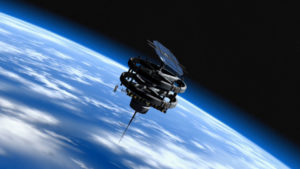 Released in 2003, Planetes primarily follows the lives of six members of a fictional space-based corporation called Technora in the year 2075. Based out of a large space station in earth orbit, Technora is made up of a number of different divisional Sections each with their own jobs and responsibilities. Our main cast doesn’t work in the Control Section which acts as the space station’s air traffic control, nor do they work in Administrative section or Engineering Section or Accounting Section… no, they work for Technora’s much derided Debris Section. Their job is to go out in an old beat up cargo shuttle and retrieve or deorbit space debris before it can collide with other ships, satellites, or stations. They are essentially Space Trash Collectors, and while their jobs are important to help keep earth’s orbit free of dangerous space junk, they aren’t paid particularly well and don’t contribute much to Technora’s bottom line.
Released in 2003, Planetes primarily follows the lives of six members of a fictional space-based corporation called Technora in the year 2075. Based out of a large space station in earth orbit, Technora is made up of a number of different divisional Sections each with their own jobs and responsibilities. Our main cast doesn’t work in the Control Section which acts as the space station’s air traffic control, nor do they work in Administrative section or Engineering Section or Accounting Section… no, they work for Technora’s much derided Debris Section. Their job is to go out in an old beat up cargo shuttle and retrieve or deorbit space debris before it can collide with other ships, satellites, or stations. They are essentially Space Trash Collectors, and while their jobs are important to help keep earth’s orbit free of dangerous space junk, they aren’t paid particularly well and don’t contribute much to Technora’s bottom line.
There are a two main things that make Planetes something of a must watch anime:
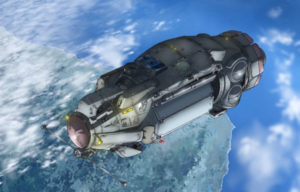 1. It is set in a near future of commercial space operations that you can almost see from the here and now if you squint hard enough. Planetes gets almost everything about space right. Spacesuits are big and bulky. Moving around in zero gravity is tough to get a hang of. Ships don’t zip about or change directions easily even when their engines are at full power. And, of course, engines, thrusters, and, heck, even laser defense satellites make zero noise out in the vacuum of space.
1. It is set in a near future of commercial space operations that you can almost see from the here and now if you squint hard enough. Planetes gets almost everything about space right. Spacesuits are big and bulky. Moving around in zero gravity is tough to get a hang of. Ships don’t zip about or change directions easily even when their engines are at full power. And, of course, engines, thrusters, and, heck, even laser defense satellites make zero noise out in the vacuum of space.
We get to see everything from moon colonies, to astronaut training, to a spaceship capable of transversing the solar system, but it’s all done in ways that makes a whole lot of sense given where actual space technology seems to be going. Planetes’ realistic vision of life in space is easily one of the best out there in any medium.
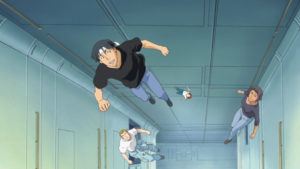 2. Its complex, well rounded characters and their relationships drive the show. Yes, there are some interesting plots and happenings that put our Debris Section employees into challenging situations, but more so it’s the hopes, fears, and desires of our main cast that push them into places they never thought they would, or could, end up. Sometimes, their journeys are a struggle. Not everyone is ascendent. Not everyone achieves their goals. And the ones that do sometimes take routes that both they, and their colleagues, wish they hadn’t.
2. Its complex, well rounded characters and their relationships drive the show. Yes, there are some interesting plots and happenings that put our Debris Section employees into challenging situations, but more so it’s the hopes, fears, and desires of our main cast that push them into places they never thought they would, or could, end up. Sometimes, their journeys are a struggle. Not everyone is ascendent. Not everyone achieves their goals. And the ones that do sometimes take routes that both they, and their colleagues, wish they hadn’t.
That’s not to say Planetes is depressing or all about drama, drama, and more drama. It, and its characters, have good times as well as bad. The members of Debris Section, in particular, are mostly oddballs that are somewhat looked down upon. They don’t have a lot of staff. They have barely any corporate influence at all. But, on the plus side, it means that they aren’t all that closely supervised and can get away with a good bit of goofing off and trouble making that the more respectable sections, like Control Section, could only dream of.
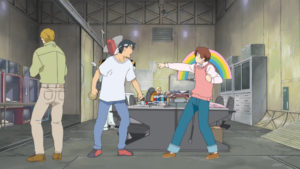 On top of that, some of the main cast can get pretty eccentric at times. Take Ai Tanabe, the newest, most inexperienced member of Debris Section who will, at the drop of a hat, yell your head off about how life is not worth living without love even as everyone around her scoffs or mocks her for it. Or, take Fee Carmichael, Debris Section’s primary ship pilot whose addiction to smoking, despite living in space where it is almost universally forbidden, leads to one of the most exciting moments in the series. Then there’s Debris Section’s second in command, Arvind “Robbie” Lavie, who is such a bend over backwards yes man completely devoted to pleasing the highest ranking person in the room that his antics drive a decent portion of the show’s comedy.
On top of that, some of the main cast can get pretty eccentric at times. Take Ai Tanabe, the newest, most inexperienced member of Debris Section who will, at the drop of a hat, yell your head off about how life is not worth living without love even as everyone around her scoffs or mocks her for it. Or, take Fee Carmichael, Debris Section’s primary ship pilot whose addiction to smoking, despite living in space where it is almost universally forbidden, leads to one of the most exciting moments in the series. Then there’s Debris Section’s second in command, Arvind “Robbie” Lavie, who is such a bend over backwards yes man completely devoted to pleasing the highest ranking person in the room that his antics drive a decent portion of the show’s comedy.
Every member of the Debris Section, and quite a few of the lesser cast of characters, all have senses of humor, and personal sticking points, and reasons for why they behave the way they do. There are friendships made and broken. Arguments that persist a long time only to finally be resolved. And choices that make total sense but will, at the same time, have you wanting to grab hold of characters and shake them, and make them realize just what they are doing to themselves and others.
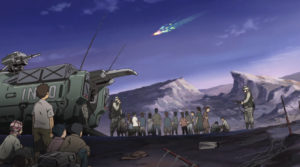 Another reason I like it is Planetes speaks to bigger things. With so many realistically portrayed characters, it kinda has to. As the show progresses, it touches on things like: national economic disparity, racism, abusive relationships, corporate greed, dying with dignity, harsh uncompromising determination, and more. But, again, Planetes isn’t a depressing show by any means. There are plenty of friendships and growing moments and characters finding the strength to overcome their troubles or hold fast to their ideals, too.
Another reason I like it is Planetes speaks to bigger things. With so many realistically portrayed characters, it kinda has to. As the show progresses, it touches on things like: national economic disparity, racism, abusive relationships, corporate greed, dying with dignity, harsh uncompromising determination, and more. But, again, Planetes isn’t a depressing show by any means. There are plenty of friendships and growing moments and characters finding the strength to overcome their troubles or hold fast to their ideals, too.
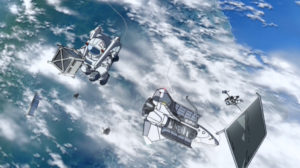 Animation wise, Planetes is decent, but there’s always a sense that it sure would have been great if it had been made in 2013 instead of 2003. Don’t get me wrong, ships and stations and characters and background are all pretty well detailed and animated, but the show does maybe lack the sort of awe inspiring grandeur that a realistic show set in 2075 made more recently might otherwise have. In particular, I wish some of the shots of earth were crips, detailed, 4k backdrops instead of nice but somewhat blurry 2003 artwork. That said, everything space related is so well realized, plus this is one of the fairly rare shows that actually take the time to make good graphics for the things that appear on screens and reports, so that, at least, makes me happy.
Animation wise, Planetes is decent, but there’s always a sense that it sure would have been great if it had been made in 2013 instead of 2003. Don’t get me wrong, ships and stations and characters and background are all pretty well detailed and animated, but the show does maybe lack the sort of awe inspiring grandeur that a realistic show set in 2075 made more recently might otherwise have. In particular, I wish some of the shots of earth were crips, detailed, 4k backdrops instead of nice but somewhat blurry 2003 artwork. That said, everything space related is so well realized, plus this is one of the fairly rare shows that actually take the time to make good graphics for the things that appear on screens and reports, so that, at least, makes me happy.
All in All:
Planetes is a wonderful show for anyone who loves space. It gets so much right in so many areas that the few places it is lacking are almost just complete non-issues.